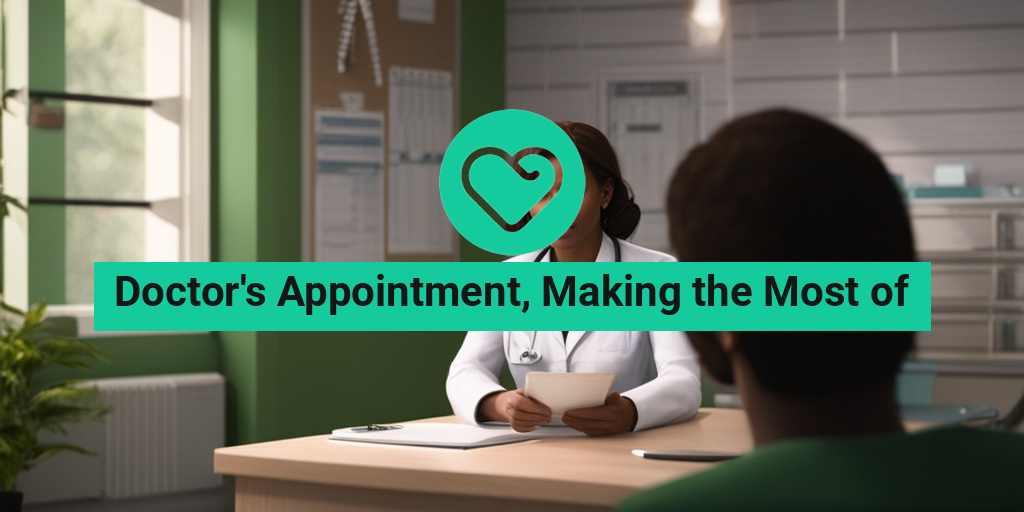“`html
Preparing for Your Appointment
Making the most of your doctor’s appointment starts long before you step into the office. Proper preparation can significantly enhance the quality of your visit and ensure that you get the answers and care you need. Here are some essential steps to take before your appointment:
1. Know Your Medical History
Before your appointment, take some time to review your medical history. This includes:
- Previous diagnoses: Be aware of any past health issues.
- Medications: List all medications you are currently taking, including dosages and frequency.
- Allergies: Note any allergies you have, especially to medications.
Having this information at your fingertips can help your doctor make informed decisions about your care.
2. Prepare Your Questions
It’s easy to forget important questions during your appointment, especially if you’re feeling anxious. To avoid this, write down any questions or concerns you have ahead of time. Consider asking about:
- Your symptoms and potential causes
- Recommended tests or procedures
- Possible treatment options and their side effects
Being prepared with questions can lead to a more productive conversation with your healthcare provider.
3. Confirm Your Appointment Details
Double-check the date and time of your appointment, as well as the location. If you’re seeing a new doctor, it might be helpful to look up their office policies, such as whether they accept your insurance and what their cancellation policy is.
4. Consider Bringing a Support Person
If you feel comfortable, consider bringing a friend or family member with you. They can help you remember important information and provide emotional support. This is especially helpful if you’re discussing complex health issues or receiving significant news.
What to Bring
When it comes to making the most of your doctor’s appointment, what you bring can be just as important as how you prepare. Here’s a checklist of items to consider bringing along:
1. Identification and Insurance Information
Always bring a valid form of identification and your insurance card. This will help streamline the check-in process and ensure that your insurance is billed correctly.
2. Medical Records
If you’re visiting a new doctor, it’s a good idea to bring any relevant medical records. This can include:
- Test results from previous doctors
- Immunization records
- Any recent imaging studies (like X-rays or MRIs)
Having these documents can provide your new doctor with valuable context about your health.
3. A List of Current Medications
As mentioned earlier, having a list of your current medications is crucial. Include:
- Prescription medications
- Over-the-counter drugs
- Supplements and vitamins
This information helps your doctor avoid potential drug interactions and tailor your treatment plan effectively.
4. A Notebook or Device for Notes
During your appointment, take notes on what your doctor says. This can help you remember important details about your diagnosis, treatment options, and follow-up care. If you prefer, you can use a note-taking app on your phone or tablet.
5. A Water Bottle and Snack
If you anticipate a long wait or if you’re prone to feeling faint, consider bringing a water bottle and a light snack. Staying hydrated and nourished can help you feel more comfortable during your visit.
By preparing adequately and bringing the right items, you can ensure that your doctor’s appointment is as productive and informative as possible. For more evidence-based health answers and resources, check out Yesil Health AI. Remember, your health is a priority, and being proactive can lead to better outcomes! 🌟
“`

“`html
Questions to Ask
When you have a doctor’s appointment, it’s essential to come prepared with questions. This not only helps you understand your health better but also ensures that you make the most of your time with your healthcare provider. Here are some key questions to consider:
General Health Questions
- What are the potential causes of my symptoms? Understanding the root cause can help you address the issue more effectively.
- What tests do I need, and why? Knowing the purpose of each test can alleviate anxiety and help you prepare.
- What are my treatment options? Discussing various options allows you to make informed decisions about your health.
Specific Questions About Your Condition
- Can you explain my diagnosis in detail? A clear understanding of your diagnosis is crucial for effective management.
- What lifestyle changes should I consider? Your doctor can provide tailored advice to improve your health.
- Are there any potential side effects of the treatment? Knowing what to expect can help you prepare mentally and physically.
Follow-Up and Future Appointments
- When should I schedule my next appointment? Regular follow-ups are vital for monitoring your condition.
- What should I do if my symptoms worsen? Having a plan in place can provide peace of mind.
- How can I reach you if I have questions after this appointment? Knowing how to communicate with your doctor can help you feel supported.
By asking these questions, you can ensure that you leave your doctor’s appointment with a clearer understanding of your health and the steps you need to take moving forward. Remember, your health is a partnership between you and your healthcare provider! 🤝
Understanding Your Diagnosis
Receiving a diagnosis can be overwhelming, but understanding it is crucial for effective management and treatment. Here are some steps to help you navigate this process:
Ask for Clarification
If your doctor uses medical jargon that you don’t understand, don’t hesitate to ask for clarification. Questions like “What does this diagnosis mean for me?” or “How does this condition affect my daily life?” can provide valuable insights.
Research Your Condition
Once you have a basic understanding, take some time to research your diagnosis. Reliable sources such as medical websites, patient advocacy groups, and peer-reviewed articles can provide additional context. Just be cautious about the information you consume; stick to reputable sources to avoid misinformation. 📚
Discuss Treatment Options
Understanding your diagnosis also involves knowing the available treatment options. Ask your doctor about:
- Medications: What are the benefits and risks?
- Therapies: Are there alternative therapies that could help?
- Lifestyle Changes: What adjustments can I make to improve my condition?
Consider a Second Opinion
If you’re unsure about your diagnosis or treatment plan, seeking a second opinion can provide peace of mind. It’s perfectly acceptable to consult another healthcare provider for further insights. This can be especially important for serious conditions or when considering invasive treatments. 🩺
Stay Engaged in Your Care
Finally, remember that understanding your diagnosis is an ongoing process. Stay engaged in your care by:
- Keeping a health journal: Document your symptoms, treatments, and any questions that arise.
- Joining support groups: Connecting with others who have similar conditions can provide emotional support and practical advice.
- Regularly communicating with your healthcare team: Keep the lines of communication open to address any concerns promptly.
By taking these steps, you can empower yourself to manage your health effectively and make informed decisions during your doctor’s appointments. Remember, knowledge is power! 💪
“`

“`html
Discussing Treatment Options
When you visit your doctor, one of the most crucial aspects of your appointment is discussing treatment options. This conversation can significantly impact your health journey, so it’s essential to approach it with clarity and confidence.
Be Prepared with Questions
Before your doctor’s appointment, take some time to jot down any questions or concerns you may have. This preparation can help you feel more in control and ensure that you cover all necessary topics. Here are some questions to consider:
- What are my treatment options for this condition?
- What are the potential benefits and risks of each option?
- How long will the treatment take, and what can I expect during the process?
- Are there any lifestyle changes I should consider alongside treatment?
By asking these questions, you can gain a better understanding of your health situation and the paths available to you. Remember, it’s your health, and you have the right to be informed! 🩺
Understanding Your Options
During the discussion, your doctor may present various treatment options, which can range from medication to lifestyle changes or even surgical interventions. Here’s a brief overview of common treatment categories:
- Medications: These can include over-the-counter drugs, prescriptions, or even supplements that may help manage your condition.
- Therapies: Physical therapy, occupational therapy, or counseling can be beneficial depending on your diagnosis.
- Surgery: In some cases, surgical intervention may be necessary. Your doctor will explain the reasons and expected outcomes.
- Lifestyle Changes: Sometimes, simple changes in diet, exercise, or stress management can significantly impact your health.
It’s essential to discuss the pros and cons of each option with your doctor. This dialogue will help you make an informed decision that aligns with your health goals and personal preferences.
Involving Family or Friends
Sometimes, discussing treatment options can be overwhelming. Consider bringing a family member or friend to your appointment. They can help take notes, ask questions, and provide emotional support. Having someone else in the room can also help ensure that you don’t miss any critical information. 🤝
Follow-Up Care
After discussing treatment options, it’s vital to understand the importance of follow-up care. This phase is crucial for monitoring your progress and making any necessary adjustments to your treatment plan.
Scheduling Follow-Up Appointments
Make sure to schedule follow-up appointments as recommended by your doctor. These visits allow your healthcare provider to:
- Assess how well the treatment is working.
- Identify any side effects or complications early on.
- Make adjustments to your treatment plan if necessary.
Don’t hesitate to reach out to your doctor’s office if you have concerns between appointments. Open communication is key to effective healthcare! 📅
Keeping Track of Your Health
Maintaining a health journal can be an excellent way to track your symptoms, medications, and any side effects you experience. This information can be invaluable during follow-up appointments, as it provides your doctor with a clearer picture of your health journey. Consider including:
- Your daily symptoms and their severity.
- Any medications you’re taking and their effects.
- Changes in your lifestyle or diet.
By keeping detailed records, you empower yourself and your healthcare team to make informed decisions about your care.
Understanding Your Treatment Plan
After your initial appointment and any follow-ups, ensure you fully understand your treatment plan. Don’t hesitate to ask your doctor to clarify any points that seem confusing. A well-understood plan is more likely to be followed effectively, leading to better health outcomes. 📖
In conclusion, making the most of your doctor’s appointment involves proactive communication about treatment options and diligent follow-up care. By being prepared and engaged, you can take charge of your health and work collaboratively with your healthcare provider to achieve the best possible outcomes.
“`

“`html
Managing Your Health Records
Keeping track of your health records is essential for making the most of your doctor’s appointment. Having organized and accessible health information can significantly enhance the quality of your healthcare experience. Here are some strategies to effectively manage your health records:
1. Understand What Health Records Include
Your health records encompass a variety of documents, including:
- Medical History: Past illnesses, surgeries, and treatments.
- Medications: Current prescriptions and over-the-counter drugs.
- Allergies: Any known allergies to medications or substances.
- Test Results: Lab results, imaging reports, and other diagnostic information.
- Immunization Records: Vaccination history.
2. Create a Personal Health Record (PHR)
A Personal Health Record (PHR) is a tool that allows you to maintain your health information in one place. You can create a PHR using:
- Digital Apps: Many apps are available that allow you to store and manage your health records securely.
- Spreadsheets: A simple spreadsheet can help you track your medical history and medications.
- Physical Folders: If you prefer paper, keep a dedicated folder for all your health documents.
3. Regularly Update Your Records
It’s crucial to keep your health records up to date. After every doctor’s appointment, make it a habit to:
- Add new test results and notes from your visit.
- Update any changes in medications or allergies.
- Document any new health concerns or symptoms.
4. Share Your Records with Your Healthcare Providers
When visiting a new doctor or specialist, sharing your health records can provide them with valuable context. Consider:
- Requesting Copies: Always ask for copies of your records to share with new providers.
- Using Patient Portals: Many healthcare systems offer online portals where you can access and share your records easily.
5. Know Your Rights
As a patient, you have the right to access your health records. Familiarize yourself with the laws in your area regarding health information privacy and access. This knowledge empowers you to advocate for your health effectively.
Tips for Effective Communication
Effective communication during your doctor’s appointment is key to receiving the best care possible. Here are some tips to ensure your voice is heard:
1. Prepare Ahead of Time
Before your appointment, take some time to prepare. Consider the following:
- Write Down Questions: Jot down any questions or concerns you want to address.
- Summarize Symptoms: Create a brief summary of your symptoms, including when they started and how they have changed.
- List Medications: Bring a list of all medications you are currently taking, including dosages.
2. Be Honest and Open
Honesty is crucial for effective communication. Don’t hesitate to:
- Discuss Symptoms: Share all symptoms, even if they seem minor or unrelated.
- Express Concerns: If you have concerns about a diagnosis or treatment plan, voice them.
3. Ask for Clarification
If your doctor uses medical jargon or explains something you don’t understand, don’t hesitate to ask for clarification. You might say:
- “Can you explain that in simpler terms?”
- “What does that mean for my treatment?”
4. Take Notes
During your appointment, take notes on important points discussed. This can help you remember key information and follow up on any recommendations. If you’re uncomfortable taking notes, consider bringing a friend or family member to help.
5. Follow Up
After your appointment, don’t hesitate to reach out if you have additional questions or concerns. A quick email or phone call can clarify any lingering doubts and ensure you’re on the right track with your health management.
By managing your health records effectively and communicating openly with your healthcare provider, you can make the most of your doctor’s appointment and take charge of your health journey! 🩺✨
“`

“`html
Frequently Asked Questions about Making the Most of Your Doctor’s Appointment
Why is it important to prepare for a doctor’s appointment?
Preparing for a doctor’s appointment helps ensure that you get the most out of your visit. It allows you to communicate your concerns effectively, ask relevant questions, and understand your health better.
What should I bring to my doctor’s appointment?
- Identification: Bring a valid ID and your insurance card.
- Medical history: Prepare a list of your medical history, including past surgeries, medications, and allergies.
- Questions: Write down any questions or concerns you want to discuss with your doctor.
- Current medications: Bring a list of all medications you are currently taking, including dosages.
How can I effectively communicate with my doctor?
To communicate effectively during your doctor’s appointment, consider the following tips:
- Be honest about your symptoms and concerns.
- Use clear and concise language.
- Ask for clarification if you don’t understand something.
- Take notes during the appointment to remember important information.
What questions should I ask during my appointment?
Here are some essential questions to consider asking:
- What could be causing my symptoms?
- What tests do I need, and why?
- What are my treatment options?
- What lifestyle changes can I make to improve my health?
How can I follow up after my appointment?
After your doctor’s appointment, it’s important to:
- Review any instructions or prescriptions given by your doctor.
- Schedule any necessary follow-up appointments.
- Contact your doctor’s office if you have further questions or concerns.
What if I feel my concerns are being invalidated?
If you feel that your concerns are not being taken seriously, consider the following steps:
- Express your feelings directly to your doctor.
- Seek a second opinion from another healthcare provider.
- Document your symptoms and concerns to present a clear case.
How can I show gratitude to my doctor?
Showing gratitude can strengthen your relationship with your healthcare provider. Here are some ideas:
- Write a thank-you note expressing your appreciation.
- Leave a positive review online.
- Share your success story with others.
What should I do if I have a negative experience?
If you have a negative experience during your doctor’s appointment, consider the following actions:
- Discuss your concerns with the doctor or their office staff.
- File a complaint with the healthcare facility if necessary.
- Seek support from patient advocacy groups.
How can I make the most of telehealth appointments?
To maximize your telehealth experience:
- Ensure you have a stable internet connection.
- Choose a quiet, private space for the appointment.
- Prepare your questions and concerns in advance.
Conclusion
Making the most of your doctor’s appointment involves preparation, effective communication, and follow-up. By taking these steps, you can enhance your healthcare experience and ensure that your health needs are met.
“`




